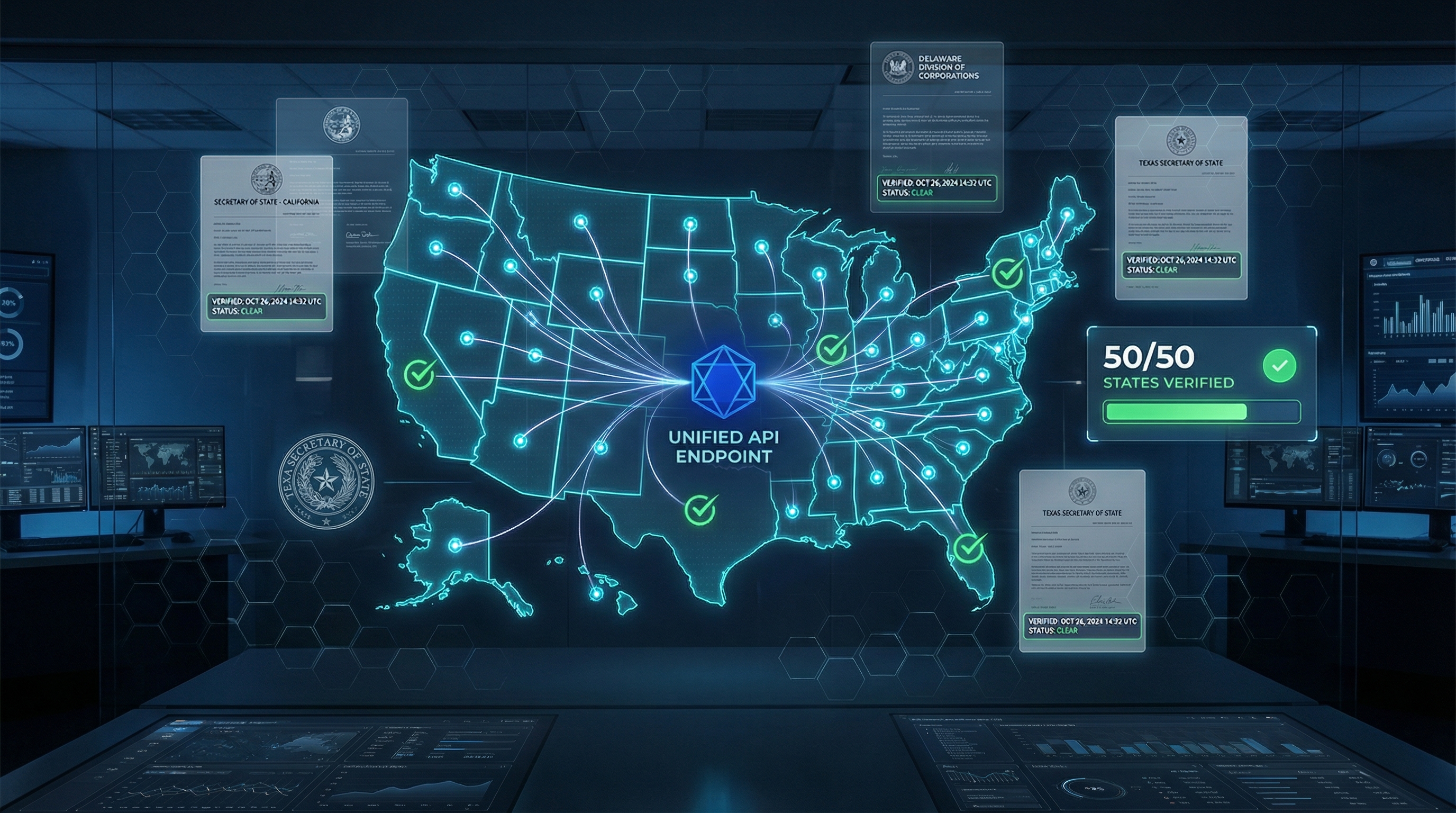Multi-state coverage and jurisdiction tracking are important considerations when using a Secretary of State (SOS) API. Here's a breakdown of the key points:
Multi-State Coverage and Data Availability
- Varying Data Availability: Data availability and the type of information provided varies significantly across different states. Some states may offer more detailed information, such as officer details and documents, while others provide very limited data. For example, New Jersey is noted as having very little public information available, and Delaware does not reveal status information without payment.
- State of Formation: Lenders are interested in identifying if a business is registered in a state different from its original formation. Some states provide a "state of formation" field, indicating where the business was initially registered. This information is crucial for accurately assessing the time in business. Approximately 35 states have this field, while the remaining states may reveal this information in other ways.
- Full Verification Across States: Cobalt API offer a "full verification" option that checks all 51 jurisdictions (including the District of Columbia) to determine if a business is registered in multiple states. This is useful for registered agents who need to know where a business is registered.
- Data Normalisation: Despite the variations in data availability, Cobalt API often include features to normalise field names across different states, making data consumption easier and consistent.
- Uptime Monitoring: State websites can go down, and that this can affect the ability to get data.
Jurisdiction Tracking
- Primary Search Parameters: The API primarily uses the legal business name and jurisdiction (state of incorporation) for searches. While some states offer additional search options, such as officer information or document availability, this varies by state.
- Handling Multi-Region Businesses: When a business operates in multiple regions, the API will return records that match the company name in different states, including foreign entity records. Some states will indicate the state of formation for foreign entities, which can help track the history of a company that has moved.
- Specifying Jurisdiction: For most verification customers, it is expected that they will know the jurisdiction. When the jurisdiction is not known, it is possible to search all states, although this may cost more.
- Address and Zip Code: While the primary search parameters are business name and jurisdiction, the use of a zip code can help improve the accuracy of a search. However, addresses can be inconsistent and are not usually recommended as a primary search parameter.
Challenges and Considerations
- Latency: Accessing live data from state websites can cause latency issues. The speed of data retrieval depends on the responsiveness of the state's website. Cobalt API offers a cached database option to mitigate this, which is faster but may contain less up-to-date information. A recommendation was made to query the database first and then fall back to live data if a hit is not found.
- Data Accuracy: While Cobalt API aims to provide the most up-to-date information, the accuracy of the data is dependent on the state’s records. API providers do not guarantee the quality of the data returned, as it is the same data available on the state's website.
- Search limitations: Most states do not provide the option to search by EIN, though Florida does allow it as an optional field. The primary search parameters for most states are legal name and jurisdiction.
- Data Coverage: The coverage of the cached database varies, with better coverage in larger states like Texas, Florida, New York, and California. Some states may have minimal or no cached data, which may impact the speed of searches.
- Cost: Searching across all states typically costs more than a single jurisdiction search. Cobalt API charges a multiple (e.g. three times) the cost for a multi-state search. If the cached database is used, it will not bill for lookups that return no matches, but live searches will still incur costs whether there's a match or not, as this provides a signal that the business is not registered.
Recommendations
- Prioritise Legal Name and Jurisdiction: When conducting a search, it is recommended to provide the legal business name and state of incorporation.
- Use Zip Codes: If available, adding a zip code to the search can increase the accuracy of results.
- Consider Cached Data: If speed is a priority and a lender is willing to accept a small risk of slightly out-of-date data, it is recommended to query the cached database first, and then roll over to a live data search if necessary.
- Test and Validate: It is advisable to utilise a sandbox environment and test parameters to validate data accuracy and integration functionality.
- Clarify Data Coverage: It's important to clarify data coverage for specific states and update frequency with the API provider.
By understanding these considerations, lenders can effectively use SOS APIs for multi-state coverage and jurisdiction tracking, optimising their operational processes while maintaining data accuracy and compliance.
Multi-state coverage and jurisdiction tracking are important considerations discussed throughout the sources, particularly in the context of contractor license verification. Here's a breakdown of the key points:
- Initial States for Contractor License Verification: The initial rollout of contractor license verification is planned for four states: California, Texas, New York, and Florida. These states were chosen because they are considered high-priority based on population and business activity.
- Expanding to Additional States: There's a desire to expand beyond the initial four states, driven by customer demand. However, there are also concerns regarding the maintenance and cost of adding more states.
- Maintenance Costs: Each additional state adds to the overall maintenance burden due to frequent changes in government websites and processes.
- Usage vs. Maintenance: There's a concern about adding states with low usage as the maintenance cost is the same regardless of usage. It is noted that adding states that are not commonly used by customers may not be worth the cost of maintenance.
- Prioritising States: States with higher volumes of customer usage will be prioritised over others.
- Customer Heat Map: A heat map of where customers are requesting contractor license verification is being developed to help in making decisions about which states to add.
- Oregon's Unique Situation: Oregon is a high-priority state due to legal requirements for license checks. It is a "must-have" for at least one large customer for whom the service is being developed. However, Oregon's website is more difficult to work with due to the presence of a CAPTCHA.
- State vs. City Level Verification: The initial focus for contractor license verification is at the state level. City-level verification is more complex and is not part of the initial plan.
- Data Consistency and Portals: There are questions about whether each state has a single portal for all types of contractor licenses or if there are different portals for different types of contractors (e.g., plumbers, electricians). The sources suggest that states generally have one main portal where all contractor licenses can be found. However, some states may have different links that all redirect to the same portal.
- Data Source: The data for verification is pulled directly from each state's website in real-time, ensuring the most up-to-date information. There is also a cached backup for most states that is updated monthly to help with situations where the government websites may not be working.
- API Implementation: The API for contractor license verification is intended to be very similar to that of the Secretary of State API.
- Call Back URL: There are discussions about whether to implement a call back URL for the contractor license API to ensure an efficient way to handle long requests. While it is not planned initially, there is a recognition that the service may need to use it in the future to accommodate expansion to more states and jurisdictions.
In summary, the sources highlight a clear need for multi-state coverage for contractor license verification, with an initial focus on a few key states and a recognition that additional states will be added based on customer demand and cost/benefit analysis.











.png)